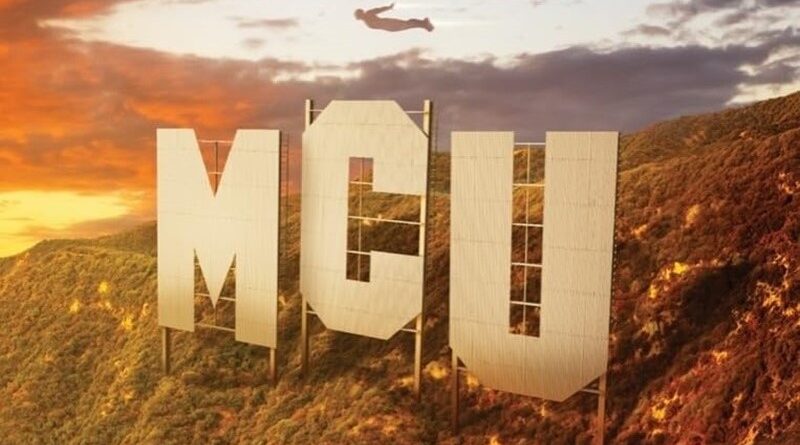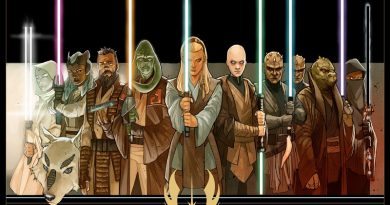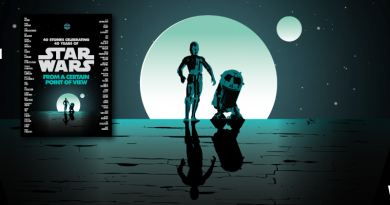Lessons in Franchise Management – MCU: The Reign of Marvel Studios
With their lengthy tome MCU: The Reign of Marvel Studios,authors Joanna Robinson, Dave Gonzalez, and Gavin Edwards provide a lively and well-sourced work of corporate history, interpersonal melodrama, and franchise management analysis. While the authors are transparent in their high regard for Marvel Studios, the successes of the Marvel Cinematic Universe, and (most of) the individual executives and contributors, they do not shy away from recounting unflattering actions or personalities, the burdens and burnout caused by high-pressure corporate deadlines or workloads, and the undeniable challenges in maintaining its previous high standards of storytelling since the release of Avengers: Endgame and Spider-Man: Far From Home in 2019. Published on October 10, 2023, MCU devotes almost exactly two-thirds of its pages to the origins of movie storytelling with Marvel Comics characters, the formation of Marvel Studios, and the creation and release of Phases One and Two of the MCU. That period concluded with Avengers: Age of Ultron and Ant-Man, but perhaps equally importantly with the development that the authors’ timeline denotes plainly as “August 31, 2015 – Kevin Feige no longer reports to Ike Perlmutter” (page xii). Fortunately, MCU contains over 130 pages on the subsequent years of the franchise, including previously unreported details from more recent projects and their consequences. Particularly for fans less familiar with the backstory of Marvel Studios and the franchise, MCU offers an entertaining narrative history.

From the perspective of FANgirl Blog and our longstanding evaluation of the successes and failures of Lucasfilm’s stewardship of the Star Wars franchise, MCU contains a number of interesting points of comparison and contrast. For example, MCU not only describes the immediate incidents of conflict between Feige and Perlmutter regarding characters and storylines in the MCU film slate, but also traces various threads of corporate politics such as Perlmutter’s purchase of Marvel out of its bankruptcy in the late 1990s, Bob Iger’s role as Disney CEO and his acquisition of Marvel in 2009, and ultimately a culmination in Perlmutter’s ouster by Iger in early 2023 (which has since been followed by Perlmutter’s involvement in a proxy battle against Iger led by investor Nelson Peltz). For Lucasfilm, the comparable tale with figures including Iger, George Lucas, Kathleen Kennedy, Kiri Hart, Michelle Rejwan, Dave Filoni, and Carrie Beck has yet to be written – though it undoubtedly would prove equally fascinating.
Less prominently, MCU touches upon another similarity with Star Wars: the importance of merchandise and the ingrained biases in that sector of the industry. Iger acquired Marvel and Lucasfilm in significant part because he perceived that “the weakest demographic for Disney was young men” (page 139). Early in their Disney tenure, both franchises faced backlash for excluding important female characters from toys, t-shirts, and other products, including Black Widow in The Avengers (2012) and Age of Ultron (2015), Gamora in Guardians of the Galaxy (2014), and Rey in The Force Awakens (2015). At Marvel, Perlmutter deliberately insisted upon the exclusion of female characters and characters of color not just from the toys and merchandise, but even from the movies themselves. Lucasfilm did not have that problem; if anything, the obsession with secrecy and preventing spoiler leaks undercut the ability of licensees to launch timely toys and merchandise with important characters. But Star Wars, too, operated from presumptions that boys would not play with action figures of female characters, that men predominated the collectibles market, and that women would not be reliable profitable customers – only to be dramatically proven wrong by licensees such as Her Universe, Covergirl, ColourPop, RockLove, and more.
Star Wars fans sometimes exaggerate the extent to which George Lucas was making it up as he went along while creating his Star Wars movies. Undeniably, though, Lucas engaged in a significant amount of storytelling improvisation during the Original Trilogy, and later during the Prequel Trilogy he left many important details to be worked out when writing each film (such as devising Count Dooku and General Grievous or the specifics of Anakin’s fall and Padmé’s fate) even if the broad strokes of the trilogy’s culmination and the key character arcs were apparent while working on Episode I. MCU serves as a good reminder that, for all of its later success, Marvel Studios also undertook a substantial amount of seat-of-the-pants storytelling in its early years – and, like Lucas, benefitted from some lucky breaks and skillful last-minute tweaks to movie endings. At the same time, MCU reinforces an important difference: Lucasfilm (and Disney, due to movie release schedule demands from Iger) chose to produce the Sequel Trilogy without first developing a strong sense of the characters, their story arcs, and the interaction between those character arcs and the plot and world-building. While it is true that Marvel Studios did not have a fully developed master plan all the way through its grand finale even in 2015 (roughly the midpoint between Iron Man and Endgame), MCU makes clear that Feige and his team undertook significant story planning and coordination as early as Phase Two, and especially in Phase Three and beyond. The franchise history described in MCU serves as a reminder that the Sequel Trilogy should not have been handled like Iron Man or Thor, finding their footing in a new saga, but rather like Iron Man 3 or Captain America: The Winter Soldier, the seventh and ninth movies in an ongoing series.
As it turned out, the Sequel Trilogy suffered from an even deeper fundamental flaw: the absence of a clear vision of what Star Wars is, why its stories have resonated for so long, and how to shape its stories going forward to maintain those fundamental features. By contrast, MCU elaborates across its narrative how a large part of Marvel Studio’s success can be attributed to that kind of vision:
Other studios repeatedly tried, and failed, to find an IP steward who could replicate Kevin Feige’s accomplishments at Marvel Studios. The job appeared to be nearly impossible, requiring a precise balance between what was best for the brand and what was best for the characters. … Feige went deeper into Marvel lore than most other producers would have, and in doing so decided that the core appeal of the comic books was their sprawling interconnectedness, which made them perfect IP for an open-ended world-conquering franchise in the new era where franchises were king. (pages 350-351)
Relatedly, the Sequel Trilogy also was undercut by Kennedy’s decision that the three movies would end, rather than continue, the Skywalker Saga. More than two decades of Expanded Universe tales had demonstrated that Star Wars contained capacious potential for an ongoing narrative with its central characters (and their descendants), yet Lucasfilm instead boxed up those stories as Legends in 2014 and precipitously terminated the adventures of the saga’s best-known protagonists. Describing the challenges faced by Marvel Studios in Phase Four and beyond, MCU writes:
The studio has sailed at full speed into a sea of dilemmas familiar to the writers and illustrators of Marvel comics: how to extend a story with no obvious endpoints, how to keep familiar characters relevant, how to constantly reinvent the formula for success without rebooting the whole enterprise. (page 8)
And yet the Expanded Universe, too, had confronted and pushed through those same dilemmas. At times to great acclaim, and admittedly with less success on other occasions, the track record of the Expanded Universe contained numerous lessons that the cinematic side of the Star Wars franchise could have learned and incorporated. Reflecting her longstanding sentiments and previous remarks, Kennedy notoriously told Rolling Stone as late as 2019 that making Star Wars movies was difficult because “There’s no source material. We don’t have comic books. We don’t have 800-page novels. We don’t have anything other than passionate storytellers who get together and talk about what the next iteration might be.”
Feige and his team, by contrast, were willing to examine and mine for ideas everything in the Marvel comics source material, from the profound to the silly and from the beloved to the obscure – and certainly not merely a limited set of initial and foundational contributions by Stan Lee, Jack Kirby, and Steve Ditko. MCU shows Feige leaning into the comics for guidance on characterization and emotional weight when he served as a lowly assistant on the earliest Fox X-Men movies, the Russo brothers finding inspiration in far more recent comics for Captain America: The Winter Soldier, and the company promulgating a document identifying the core traits and principles of Peter Parker’s Spider-Man character and stories to ensure consistency across appearances well beyond the comics. Lucasfilm’s Sequel Trilogy, meanwhile, failed to deliver portrayals of its Original Trilogy legacy heroes that widely resonated with fans and never clearly defined the identities, character arcs, and thematic roles of its principal next-generation characters. The existing Expanded Universe source material was far from perfect, but it was certainly better than … nothing.
Kennedy’s 2019 Rolling Stone interview likewise reiterated another familiar talking point from the 2012-2019 era of Lucasfilm: the objective of hiring talented filmmakers to play in the Star Wars sandbox and the studio’s role in facilitating them in telling their stories, rather than hiring screenwriters and directors to advance the storylines selected by the franchise stewards (as later occurred with The Mandalorian, The Book of Boba Fett, and Ahsoka). While Marvel Studios has enabled a wide range of creators to showcase their talents – no one would confuse Branagh’s Thor with Waititi’s Thor: Ragnarok or Gunn’s Guardians of the Galaxy with Coogler’s Black Panther – a core principle has guided for many years:
The Incredible Hulk, starring Edward Norton and released in the summer of 2008, remains one of Marvel’s least-loved projects. It’s the movie newcomers to the MCU are encouraged to skip. But it also taught Marvel Studios a valuable early lesson about the limits of collaboration. Put another way, Marvel learned that top-down authority and creativity are not necessarily in conflict with each other. (page 97)
Perhaps another passage from MCU best makes the point:
The Russos’ experience as executive producers was as crucial as their experience as directors, given that the Marvel method of filmmaking favored strong managers, not auteurs. (page 239)
For all that Hollywood likes to celebrate its supposed visionaries, in the franchise context the results delivered by the Russo brothers as directors and Markus and McFeely as screenwriters speak for themselves: at the global box office, Captain America: Civil War outgrossed Rogue One, Infinity War matched The Force Awakens, and Endgame grossed more than The Last Jedi and The Rise of Skywalker combined.
For all of that triumph in audience acclaim, fan response, and financial zenith, however, Marvel Studios undeniably has struggled to maintain the caliber of its stories and their reception since the subsequent stories began to roll out in 2021. Perhaps the aspiration to propel the audience into stories denominated as Phases Four, Five, and Six before a single one of them ever hit the screens has been part of the problem (exacerbated by decisions of Disney leadership to insist upon a torrent of content for the new Disney+ streaming service). In its final chapter, MCU describes Feige and his creative stewards as overextended to the point they could no longer maintain the quality-control processes that had been the franchise’s hallmark. In recent years, it seems, Feige has lost sight of his own advice:
“Don’t worry about the universe. Worry about the movie. … If we’re going to plant a seed in this movie that was going to be awesome and pay off three movies later, but that seed is not working and that seed is screwing up the movie, goodbye. We’ll do something else later. Make the movie work.” (page 187)
Now that the upcoming slate of Marvel Studios movies and series has been significantly reduced in quantity and pace, the Marvel Cinematic Universe has the opportunity to reset its relationship with the fans and general audience. Though they may be displeased to have some of their less flattering moments widely shared, the franchise stewards would be wise to read and think about MCU: The Reign of Marvel Studios as they seek to recalibrate the franchise back on the right track. As they carry out a concurrent recalibration of their own, the Star Wars franchise stewards would be wise to do the same.
- BJ Priester Talks The Acolyte Episode 6 on Who’s the Bossk? - July 7, 2024
- Dave Filoni Talks Writing AHSOKA and Guiding the Future of Star Wars Storytelling - June 21, 2024
- Lessons in Franchise Management – MCU: The Reign of Marvel Studios - January 14, 2024











Pingback:Franchise Management Insights: Marvel Studios' Domination in the MCU - Comic Book News